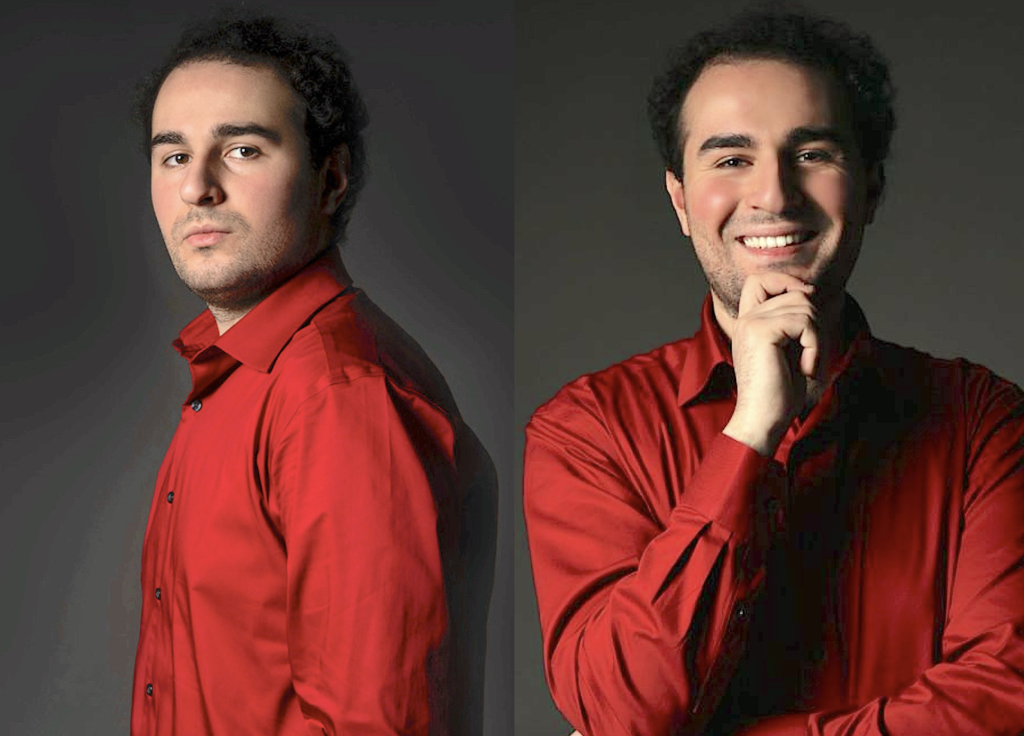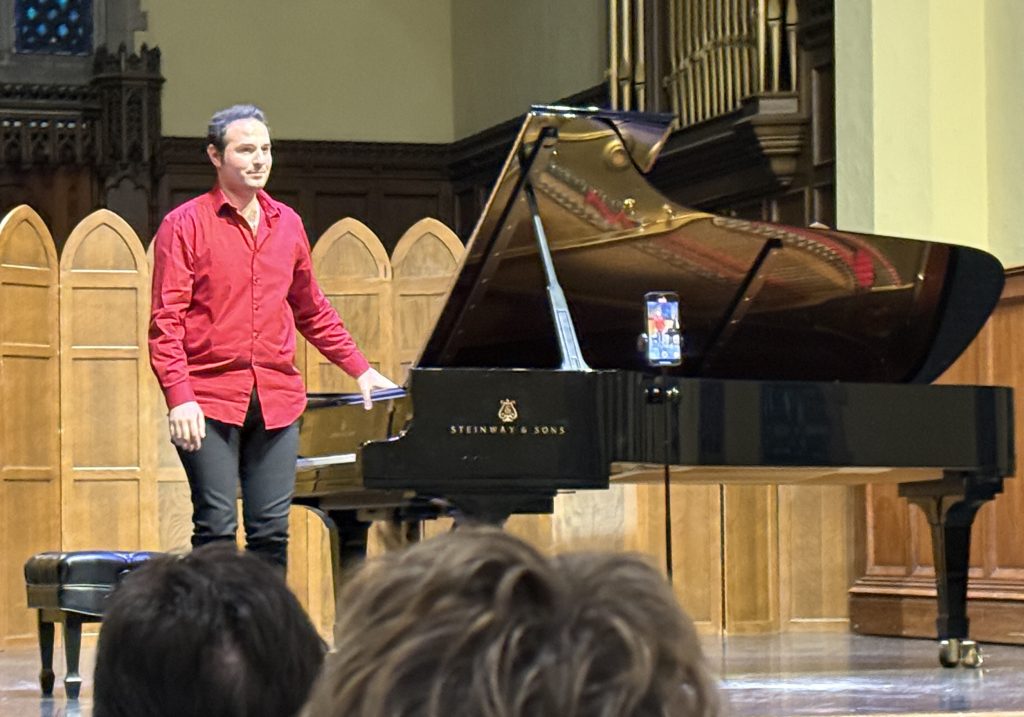Pianist Ali Mammadoff puts an audience at ease because he is himself at ease. He plays with a plush, rounded tone that never skimps on clarity or logic, and his warm personality and comfort onstage are felt from the very first note. His August 28th program of Beethoven, Chopin, and Brahms at Park University’s Graham Tyler Memorial Chapel was one of the most subtle and elegantly beautiful recitals I have heard in a long time. It served as a sort of unofficial opening to Park’s distinguished International Center for Music concert series. (See full schedule below.)

Originally from Baku, Azerbaijan, Mammadoff currently studies with Stanislav Ioudenitch at Park and pursues an active concert career. Having studied in Baku and at New York’s Manhattan School (with Phillip Kawin), and subsequently at the UMKC Conservatory (with Alon Goldstein), he has grown into an artist of impressive stature. He seems incapable of producing an ugly sound, even in fortissimo passages. And it comes as no surprise that at one point he considered a career in jazz: His imagination keeps you interested, with dashes of freshness and spontaneity. One has the feel of an improvisatory journey, possibly akin to how this music sounded when the composers themselves played it.
The three Intermezzi of Brahms’ Op. 117, which some pianists approach with a squarely “Classical” sense of gesture and phrasing, sounded in Mammadoff’s hands more like the late-Romantic pieces that they actually are. The opening Andante moderato was played rhapsodically, with surprising inner voices pinging forth throughout. The Andante non troppo breathed with ease and flexibility, while the final Andante con moto brought drama to play. (How much rubato can Brahms withstand? is a question I have not frequently asked myself—yet Mammadoff brought this issue to mind, even as his perfumed Brahms felt completely convincing.)
Beethoven’s early C-major Sonata, Op. 2, No. 3 was formed from measured stealth. The brisk tempo of the Allegro con brio was fun rather than rushed, and the second subject was pedaled with restraint. (At this pace, one could have played the first-movement repeat without anyone complaining.) The impetuous liberties of line and phrasing in the development section felt organic. The Adagio contained enough expressive freedom and lyricism to keep the mind engaged, and when the notorious Parkville train passed outside during the Scherzo movement, the pianist was not shy about “playing out” to compete with it. The Allegro assai emphasized the assai (“very”); the middle section grabbed you by the shoulders in much the same way that Beethoven’s own pianism might have in 1795.

Chopin’s Preludes, Op. 28, are a musical and intellectual challenge for any pianist. Ranging in length from 30 seconds to seven minutes and capturing a spectrum of moods and tempos, these 24 miniatures (in all the major and minor keys) are best served when each is treated as a distinctive gem—and yet none is fussed over to the point that we lose the sense of continuity.
Mammadoff’s approach was one of great clarity: pedaling was spare, and the at times abrupt shifts from tenderness to thunder and drama—and back again—were treated with a steady sense of purpose. The occasional brief pause (such as that after No. 6) assisted the ear in “organizing” the set. Mammadoff helped us plumb the sadness of No. 4 and the harsh destiny of No. 18. I could have used more of the bell-like clangor of No. 17, but the “Raindrop” Prelude (No. 15) felt sweet and uncluttered in its sentiment.
The encore was a gently extemporaneous rendering of Moon River, the Johnny Mercer/Henry Mancini classic, which allowed us to hear the full extent of the pianist’s gifts at designing a florid cocktail-hour texture around a familiar tune.
—By Paul Horsley
The International Center for Music: 2025-26 concert schedule
• Friday, Sept. 5 — Molly Carr, viola, and Anna Petrova, piano, 7:30 p.m., 1900 Building, Mission Woods, KS.
• Friday, Oct. 3 — Park ICM Orchestra with Guest Conductor Timothy Hankewich, 7:30 p.m., Graham Tyler Memorial Chapel (Park University), Parkville, MO.
• Thursday, Oct. 23 — Side-by-Side Chamber Concert, with members of the ICM faculty performing with principal string members of the Kansas City Symphony, 7:30 p.m., 1900 Building, Mission Woods, KS.
• Thursday, Nov. 13 — Stanislav Ioudenitch ICM Piano Studio students, 7:30 p.m. 1900 Building, Mission Woods, KS.
• Friday, Dec. 5 — Park ICM Orchestra with Conductor Steven McDonald, 7:30 p.m., Graham Tyler Memorial Chapel (Park University), Parkville, MO.
• Friday, Jan. 23 — Ben Sayevich, violin, and Lolita Lisovskaya-Sayevich, piano, 7:30 p.m. 1900 Building, Mission Woods, KS.
• Friday, Feb. 6 — Park ICM Orchestra with Guest Conductor Filippo Ciabatti, 7:30 p.m., Graham Tyler Memorial Chapel (Park University), Parkville, MO.
• Friday, March 13 — Ben Sayevich ICM Violin Studio students, Daniel Veis ICM Cello Studio students and Chung-Hoon Peter Chun ICM Viola Studio students, 7:30 p.m., 1900 Building, Woods, KS.
• Saturday, March 21 — Stanislav and Friends, 7 p.m., Kauffman Center for the Performing Arts (Helzberg Hall), Kansas City, MO.
• Friday, April 17 — Park ICM Orchestra with Guest Conductor Jason Seber, 7:30 p.m., Graham Tyler Memorial Chapel (Park University), Parkville, MO.
• Friday, May 1 — Behzod Abduraimov, piano, 7:30 p.m., 1900 Building, Mission Woods, KS.